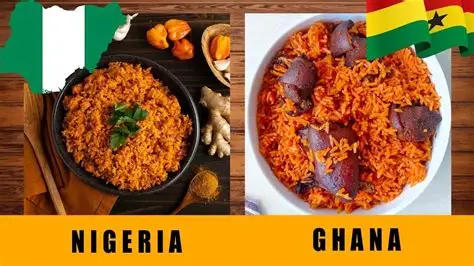Some debates shake nations. Others feed them.
And then there’s this one: Ghanaian Jollof vs. Nigerian Jollof a culinary rivalry so old, it might outlive both countries.
It’s not politics. It’s not football. It’s rice but it’s not just rice. It’s identity, pride, and generational shade, all simmered in one pot.
The Origin Story: One Pot, Two Nations, Infinite Ego
Jollof rice didn’t start in Ghana or Nigeria. Its roots trace back to the Wolof people of Senegal and Gambia the original “Thieboudienne” that started it all. But, as with most African things, we took it, remixed it, and made it our own.
Now, the spice wars began when both Ghana and Nigeria decided their version was the best.
Nigeria said: “We use long-grain parboiled rice. Accept no substitutes.”
Ghana said: “We use basmati because class.”
And the rest of Africa said, “Can we just eat in peace?”
Nigeria’s Version: Loud, Proud, and Full of Pepper
Nigerian Jollof is a full-blown experience. It doesn’t whisper flavor it shouts it from the rooftop. The tomatoes are roasted, the peppers are bold, and the rice usually tastes like it survived a small kitchen war.
The best part? That slightly burnt, smoky layer at the bottom of the pot the party rice crust is basically edible gold. It’s the kind of taste that turns ordinary rice into memory. Nigerians love their Jollof the way they love their music: loud, layered, and a little bit dramatic.
The spice hits you first, then the oil glistens in triumph, and you just know this isn’t food; it’s statement.
Ghana’s Version: Smooth, Balanced, and Politely Confident
Now, Ghanaian Jollof takes a softer approach. It’s neater, calmer, and beautifully balanced. Think of it as the cool cousin who doesn’t shout but still steals the show.
Ghanaian chefs focus on flavor layering rich tomato stew, a touch of sweetness, and rice that’s never too oily or overcooked. It’s Jollof that knows its angles every grain poised for a photo shoot.
If Nigerian Jollof is Lagos energy, Ghanaian Jollof is Accra calm: both delicious, but one definitely needs therapy after.
Social Media: The Real Battlefront
Forget embassies the real war happens online. Every few months, someone tweets “Ghanaian Jollof > Nigerian Jollof,” and chaos breaks out.
Memes fly, insults cook, and suddenly everyone becomes a culinary expert.
You’ll see tweets like:
“Ghanaian Jollof looks like it was boiled in apology.”
And then:
“Nigerian Jollof tastes like it’s holding a grudge.”
Even celebrities join the war. When Jamie Oliver tried to “reinterpret” Jollof with coriander and lemon, both nations united briefly just to roast him.
It’s Deeper Than Food
Here’s the thing: this isn’t really about rice. It’s about pride. Both nations see Jollof as a reflection of culture a symbol of who seasons best, who loves harder, who hosts better.
In a continent often divided by borders, Jollof is one of the few things that connects us even if we’re shouting about it. It’s a rivalry that binds, not breaks.
And lowkey, that’s the beauty of it. It’s the most delicious argument on earth one where everyone wins, and no one leaves hungry.
The Taste Test That Settled Nothing
Every few years, there’s some “official” Jollof competition. There was one in Washington D.C. where Ghana won, and Nigeria still hasn’t forgiven anyone involved. Another in London crowned Nigeria the champion, and Ghanaians said, “the judges were biased.”
At this point, no amount of tasting will end the debate because it’s not really about taste. It’s about belonging. And belonging is personal.
The Jollof War is the Real Peace Treaty
Maybe that’s why this argument should never end. It keeps the culture alive, the jokes flowing, and the kitchens busy.
So, here’s the truth nobody wants to admit: the best Jollof is the one you grew up eating. That’s why you’ll defend it with your life it tastes like home.
The smoke, the spice, the sweat it’s not just about food, it’s about identity. Whether you’re team Ghana or team Naija, one thing’s certain: the world should be grateful we’re still fighting over rice and not something less tasty.


Leave a Reply